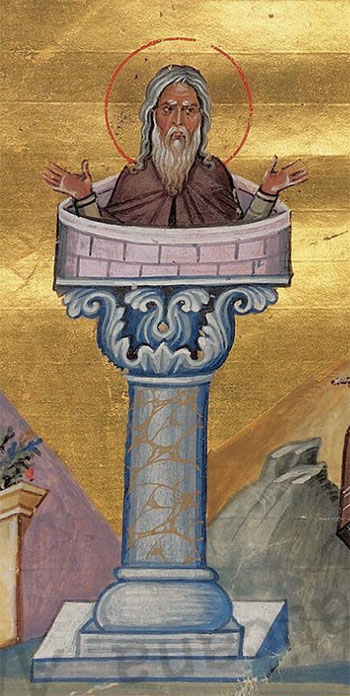
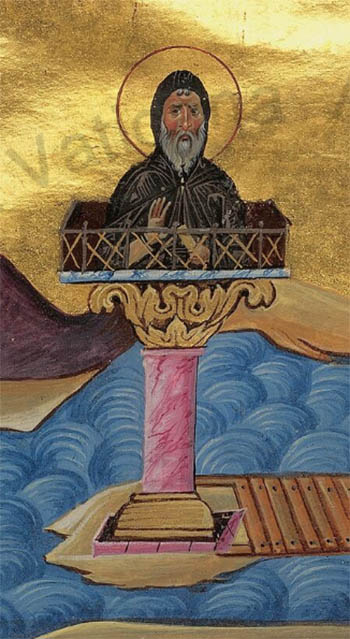
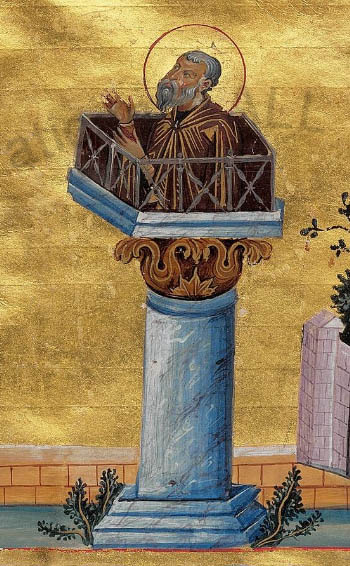
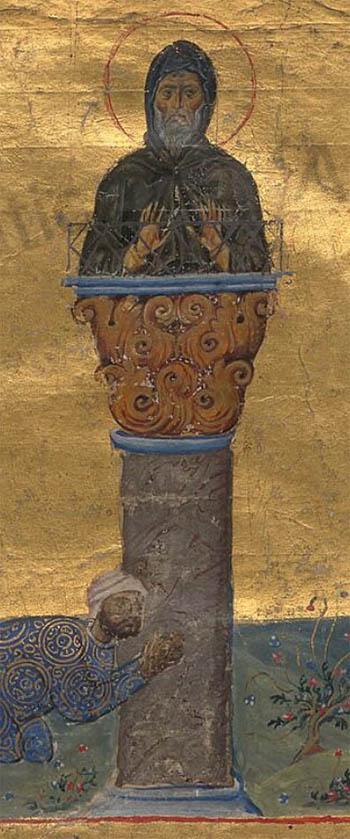

Michael VIII Paleologos. the Orthodox Church and Union with Rome
BY EDWIN PEARS, LL.B.
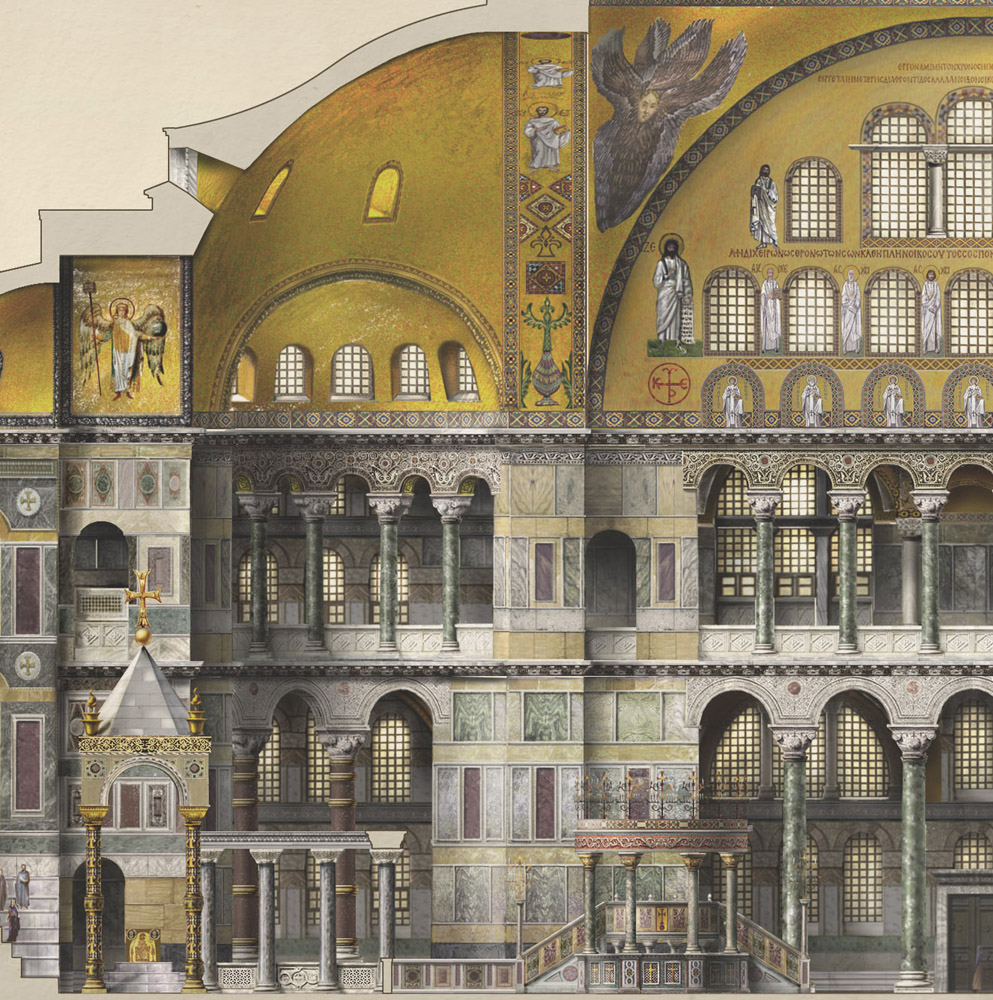 One of the most serious evils inflicted on the empire by the Latin occupation was the fierce antagonism it had created in the Orthodox Church towards that of the elder Rome. We have seen that Innocent had foreseen this result, but even he, great statesman though he was, could hardly have anticipated that the hatred aroused would be of so long a duration. When the city had been captured a Latin patriarch had been appointed, the union of the Churches had been forced upon clergy and people, and the Church, which had always considered itself the equal if not the superior of Rome, was relegated to a position of inferiority. All attempts at reunion were henceforward regarded not merely from the point of view of religion, but from that of patriotism. Union was part of the heritage of bondage. Union meant voluntary submission to the foreign Church which had been able to impose its rule during two generations. Union, therefore, in the minds of a majority of both clergy and laity had to be resisted as a badge of slavery.
One of the most serious evils inflicted on the empire by the Latin occupation was the fierce antagonism it had created in the Orthodox Church towards that of the elder Rome. We have seen that Innocent had foreseen this result, but even he, great statesman though he was, could hardly have anticipated that the hatred aroused would be of so long a duration. When the city had been captured a Latin patriarch had been appointed, the union of the Churches had been forced upon clergy and people, and the Church, which had always considered itself the equal if not the superior of Rome, was relegated to a position of inferiority. All attempts at reunion were henceforward regarded not merely from the point of view of religion, but from that of patriotism. Union was part of the heritage of bondage. Union meant voluntary submission to the foreign Church which had been able to impose its rule during two generations. Union, therefore, in the minds of a majority of both clergy and laity had to be resisted as a badge of slavery.
Though the Latin empire had perished, there still remained a Latin emperor or pretender, and he and his descendants, with the support of successive popes and aided by26 adventurers from France, Italy, and Spain, made many and constant attempts to regain the position which had been lost. For upwards of a century after the city’s recapture there was a general scramble by the European neighbours of the empire and Western powers for adjacent territory. The dominions of the emperor were large and sparsely populated, and offered an irresistible temptation to neighbouring states. More formidable, however, than all other enemies were the Turks. Though they had been attacked in the rear and were for a while rent by internal dissensions, they were steadily increasing: adding constantly by conquests to the territory over which their emirs ruled, and increasing in numbers by the never-failing stream of immigrants and born warriors coming into Asia Minor from Central Asia.
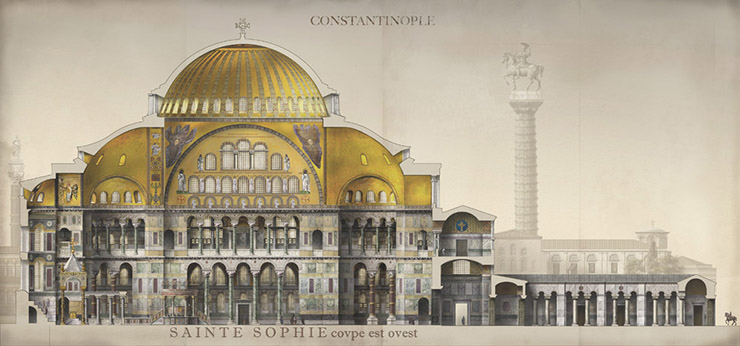 From Michael’s usurpation.
From Michael’s usurpation.Among the first difficulties encountered in the reconstruction of the empire must be noted that arising from the irregularity of Michael’s own position. It is worthy of note, not merely as a difficulty, but as showing the independent spirit of the Orthodox Church. The reader will have ample evidence of the inflexibility of its resistance on questions of dogma, but the very commencement of the reign of Michael illustrates how it was prepared to make a vigorous stand even against the deliverer of the empire on the simple ground of righteousness. We have seen that Michael had no legal claim to the throne. The de jure heir was John, a child of eight years when his father, Theodore Lascaris, died. His guardians were Michael, who had been made Grand Duke, and Arsenius the Patriarch. When a year afterwards, in 1261, the city was recaptured, it was expected by some persons of influence that Michael would either simply act as regent or associate John with him as co-emperor as soon as he became of age. Michael, however, in the same year, blinded the boy, so as to render him incapable of ascending the throne.21 Arsenius the Patriarch, as soon as the cruel deed became known, called a meeting of the bishops and boldly pronounced against the 27emperor a formal sentence of excommunication. None of the bishops opposed. They did not attempt to depose him. One can only conjecture why they hesitated. Possibly it was because they considered it expedient that he should remain on the throne, or it may be that they regarded such a step as beyond their jurisdiction. The emperor was alarmed, feared the consequences of excommunication among the troops, but feared probably still more the spiritual penalties which would follow the sentence. He preferred, says Pachymer,22 to die rather than to live burdened with the anathemas of the Church. He sought out friends of the patriarch and begged them to use all their influence to have the penalties removed. He urged that penance should be imposed, and professed himself ready to undergo any which might be deemed necessary to atone for his fault. The patriarch replied that, even if he were threatened with death, he would never remove the excommunication. The emperor went himself to visit Arsenius, and in the conversation asked whether it was his wish that he should abdicate, unbuckling his sword as he did so. When, however, the patriarch stretched out his hand to receive it, the emperor put it back. The patriarch remained firm. The emperor complained bitterly to his friends of the conduct of Arsenius, and threatened that, as his own Church would not grant him absolution, he would have recourse to the pope, who would be more conciliatory. Years passed and Arsenius constantly refused to give way. Every means thought of by the emperor of conciliating him had failed, and he at length determined to have him deposed. But threats and promises were equally unavailable. He had called together the bishops on several occasions and complained that it was impossible for him to govern the country unless he was relieved of so heavy a burden.23 On the last of these occasions he claimed that by the law of the Church every Christian had a right to absolution on doing penance, and he asked whether such laws were to be construed less favourably for princes than for other sinners. He submitted that the patriarch had treated him not only 28unjustly but illegally, and concluded by inviting the bishops to depose Arsenius.
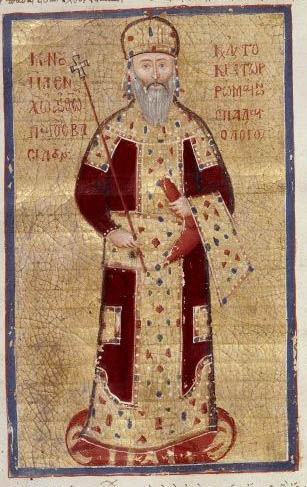 Once more he sent to ask the patriarch whether or not he would grant absolution, and once more Arsenius refused. Upon this, as the bishops would not consent to declare that he was not justified in maintaining the anathema, the emperor had Articles of Accusation drawn against him. The charges were not altogether of a trivial character. He accused him of having shortened the prayer for the emperor in matins; of having ordered the omission of the Trisagion; of having conversed in a friendly manner with the sultan of the Seljukian Turks; of having allowed him and other Mahometan companions to bathe in a bath belonging to the Church, where there were crosses; of having ordered a monk to administer the Sacrament to the sultan’s children, although he was not certain that they had been baptised.
Once more he sent to ask the patriarch whether or not he would grant absolution, and once more Arsenius refused. Upon this, as the bishops would not consent to declare that he was not justified in maintaining the anathema, the emperor had Articles of Accusation drawn against him. The charges were not altogether of a trivial character. He accused him of having shortened the prayer for the emperor in matins; of having ordered the omission of the Trisagion; of having conversed in a friendly manner with the sultan of the Seljukian Turks; of having allowed him and other Mahometan companions to bathe in a bath belonging to the Church, where there were crosses; of having ordered a monk to administer the Sacrament to the sultan’s children, although he was not certain that they had been baptised.
An assembly of bishops was convoked to examine the charges. The patriarch replied by objecting to the meeting of the court in the palace, refused to appear, and promised to send his answer to the charges in writing. Pachymer recounts in some detail how the emperor endeavoured to obtain absolution by a trick, and how Arsenius on discovering it asked him if he thought he could deceive God. The emperor in reply insisted that some of the charges should be pressed on to hearing and obtained a majority of votes condemning the patriarch.24
The patriarch was thereupon exiled.
His successor, Germanus, removed the anathema, but doubts arose in the emperor’s mind whether the removal was valid. After a few months Germanus was persuaded by the emperor to retire, and in his place the nominee of Michael, a certain Joseph, was named. The new patriarch was a courtier, and probably knew that the principal reason for his election was that absolution might be effectively and publicly given. The emperor allowed Joseph a month within which to consider the best means of granting him 29absolution, and then all was arranged. On the great feast of Candlemas, February 2, 1267, there was a notable function in Hagia Sophia for the removal of the anathema. The ceremony was a long and solemn one, the patriarch and the bishops, and probably the emperor and his suite, having had to pass the whole night in the church. The great church was crowded with worshippers or spectators. When the liturgy was completed the emperor, who had thus far remained standing surrounded by his guards and senators, drew near the Holy Gates25 behind which stood the bishops. Then, uncovered, he prostrated himself to the ground at the feet of the patriarch, publicly confessed his sin, and humbly demanded pardon. While he was thus prostrate, the patriarch, and after him each of the bishops, read the formula by which he was absolved from the crime committed against the young emperor. When all had thus given absolution, the emperor rose, was admitted to Holy Communion, and, says Pachymer, henceforward treated John with every kindness. The point, however, to be noted is that even the emperor, strong-willed usurper as he was, was not merely afraid of the terrors of the Church, but found it extremely difficult to bend it to his will so as to obtain the removal of its sentence for an unjust act, although there were many obvious advantages to the state in complying with the emperor’s wish.
From the first year of his accession Michael the Eighth set himself the task of diverting from the empire the attacks of Western states. It was not to be expected that Baldwin and the statesmen of the West would settle down resignedly to the loss of a Latin empire. During many years their attempts to regain the city constituted the most pressing danger to the empire and contributed more than any other cause during Michael’s reign to render it unable to hold its own against the encroachments of the Turks. To Michael, as to all other statesmen in Europe, the representative of the 30West was the pope. To satisfy the pope was to appease Western Europe, to divert attacks from the empire, and to cause aid to be sent against the Moslems. But the pope, on the accession of Michael, was doubly offended: first, because the Latin empire had been overthrown, and second, because the prospect of union between the two Churches was put back. Several years had to pass and many struggles had to be borne before the pontiffs reconciled themselves to the final disappearance of that Latin empire the foundation of which the great statesman Pope Innocent the Third had dreaded.
Michael, while resisting all attacks made or favoured by the pope, saw the desirability of being reconciled with him so as, if possible, to induce him not to lend his support to the efforts of Baldwin to recover the city. With this object he never lost an opportunity, even at the cost of alienating the sympathies of his own people and being denounced by his own ecclesiastics, of endeavouring to gain the pontifical favour by attempting to bring about the Union of the Churches.
It is remarkable that from his accession until the end of his reign these attempts fill a part of all contemporary histories quite disproportionate to what at first sight appears their importance. It is even more remarkable that during the whole period between the capture of the city by Michael and the Moslem siege in 1453 the dominant question of interest was that of the Union of the Churches. The fact that the representative of Western Europe was the sovereign pontiff accounts to a great extent, though not altogether, for the prominent part played by the religious question in nearly all the negotiations between the later emperors and the West. Not even the constant and almost unceasing struggle with the Turks occupies so much attention as do the negotiations with Rome, the embassies, the Councils, and the ever-varying tentatives to bring the two Churches into reconciliation. No true conception of the life of the empire can be formed unless it is realised how completely its citizens were occupied with these semi-religious, semi-political questions. On one side the popes were almost constant in their31 attempts, now to compel the Eastern Church to come in, now to persuade it; on the other, the emperors, while fully cognisant of the importance of diverting Western attacks and, at a later period, of receiving aid against the common enemy of Christendom, had constantly to meet with the dogged and unceasing opposition and bitter hostility of the great mass of their subjects to purchasing help at the price of union with the Latin Church.
A struggle began immediately on the accession of Michael and soon became a curiously complicated strife. The pope in 1262 proclaimed a Crusade against him and against the Genoese, who still remained allied with him. The pontiff characterised Michael as a usurper and a schismatic, and granted the same indulgences to those who took up arms or contributed to the expenses of the expedition against him as to those who fought for the deliverance of the Holy Land. He urged St. Louis to collect tithes for the same purpose. Michael, on the other hand, while preparing to resist invasion and strengthening the city walls, increasing his fleet, and raising new levies, yet sought to satisfy the pope by offering to do his utmost to bring about the Union of the Churches. Possibly owing to the emperor’s representations, Urban the Fourth countermanded the proposed expedition, diverting it against the Tartars who were then invading Palestine. He sent friars to Constantinople to exhort the emperor to carry out his proposal for reunion. His successor, Clement, was, however, a man of a different spirit and replied to the promises of Michael that they were only fair words intended to prevent him from aiding the dethroned Baldwin. While Michael had undoubtedly this object in view, he seems to have been sincere in his desire for Union. One of his objections to the patriarch Arsenius was that he would have nothing to do with the Latins. The Greek priests clamoured to such an extent against the patriarch who succeeded Arsenius, because he was believed to be willing to follow the emperor’s example in working for Union, that he was compelled to resign.
As time went on, the Venetians, whose influence in the city had fallen with the Latin empire, began to lose hope of seeing Baldwin re-established on the throne, and in 1267 sent to make peace with Michael. Gregory the Tenth threatened the doge with anathema if he even made a truce with him. The emperor endeavoured, though in vain, to appease the wrath of the pope by obtaining the intervention of Louis of France. Gregory, whom Michael had congratulated on his accession upon the death of Clement, was more conciliatory. He sent legates to the capital to treat once more on Union. Pachymer gives a vivid account of the negotiations which followed, an account from which it is difficult to doubt the sincerity of the emperor’s wish for reconciliation or the persistence of the opposition which he had to encounter. He states27 that the emperor followed the example of John Ducas of Nicaea, that he sent many embassies to Rome, and that his real object was to obtain from the popes protection for the Greeks. Gregory assured him that no time was so favourable as the present for putting an end to the Greek schism. The emperor on his side did his utmost to persuade the patriarch and the bishops to aid him. The Latin delegates themselves were men of piety who showed every possible respect for the Greek rite. They were invited to discuss the differences between the dogmas of the two Churches. In their interviews with the bishops they claimed that the Filioque clause which constituted the great point of discussion was a divine mystery which was impenetrable, that while the difference between the Latin formula which declared that the Holy Ghost proceeds from the Father and the Son was not really at variance with the Greek that He proceeded from the Father by the Son, they ought to be content with the reasons which the Latins adduced for inserting it in the Creed. The bishops met these observations with a rugged non possumus. Their Creed was what had been consecrated by the usage of centuries. It was dangerous for any one Church to add to the 33Symbols even words which were not contrary to the Catholic faith. The bishops openly declared that, whatever the threats of the emperor might be, they would hold to the ancient formula.
News of an expedition to restore the Latin empire came pouring in, and the emperor determined to have his own way and to conciliate the pope. In an assembly in which the patriarch, bishops, and other ecclesiastics took part he spoke at great length in favour of reconciliation. The patriarch appointed Veccus, a man famous for his eloquence and learning, to reply to him. His reply is summed up by Pachymer: ‘There are heretics who are so called. There are some who are not heretics and are not so called. There are some who are called but are not heretics, and lastly there are others who are not called but are heretics, and it is in this latter class that the Latins must be placed.’
The emperor dismissed the assembly and was violently angry against Veccus, whom he accused of having acted with bad faith. Having failed in substantiating a formal charge, he arbitrarily sent him prisoner to the Tower of Anemas. While in prison, however, Michael furnished him with books which favoured the Latin case, and, says Pachymer, as he was a man of singular simplicity and of sincere love for the truth he became disposed towards reconciliation. He was released. The emperor pressed the patriarch and the bishops to find a modus vivendi with the Latins, and was now aided by Veccus, who had discovered that the sole fault of the Western Church was that it had solely upon its own authority added the obnoxious clause to the Creed. The patriarch and the bishops, however, were obdurate. By dint of persecution, by requiring them to pay arrears of rent for their monasteries and houses, he sought to force them to come to an arrangement. He called another assembly and finally succeeded in obtaining a declaration from them with which for the time he was forced to be content. In this very assembly, however, one of the aged bishops besought him not to press the Union, assuring him that34 even if the dignitaries signed no one else would accept it. The Arsenites and the Josephites, as the followers of the two ex-patriarchs who would not comply with the emperor’s wish were called, had with them the great mass of the citizens, and the aged dignitary was probably right when he stated28 that if the emperor persisted, civil war would be the consequence.
Meantime the emperor, who could not or would not understand this bitter opposition to his desires, was aware that negotiations were going on between Charles of Anjou, king of Sicily (whose daughter had married the son and heir of Baldwin, the ex-emperor), and the Venetians for an attack upon his territories and the restoration of the Latin empire. Michael sent costly presents to the pope, and once more declared his determination to bring about Union, and asked his indulgence. Once more he sent delegates to the pope, who in return ordered Charles to facilitate their passage through his dominions and to postpone hostilities. The emperor insisted on Union, and in the following year, 1274, he and some of the bishops sent other delegates to Lyons to complete a formal reconciliation. On their arrival in that city they pronounced during the celebration of Mass the obnoxious clause. Gregory the Tenth declared that they had come voluntarily to submit themselves, to make the Roman confession of faith, and to recognise his supremacy. After George Acropolitas had read the emperor’s profession, and the envoy of the bishops theirs, a Te Deum was sung and the Union proclaimed. But whatever the pope or the emperor might wish or even do, the Eastern Church was not prepared to ratify a reconciliation. The patriarch still refused to yield. He had gone as far as he intended to go and declared that he would abdicate if the Union were accomplished. Thereupon he was deposed by the synod. Immediately afterwards the pope’s name was introduced into the public prayers, but with the result that the breach between those in favour of Union and those opposed to it became wider. The emperor pertinaciously 35persevered, and with his consent Veccus, who had now gone over to the emperor’s side, was named patriarch.
On the return of the delegates from Lyons, preaching friars were sent to Constantinople by Innocent the Fifth. On his death, in 1276, his successor, John the Twenty-fifth, sent nuncios, who were received with great honour, and Michael, in return, together with the patriarch sent delegates to confirm the Union. They arrived, however, in Rome after the death of John. In 1277 Michael and his son Andronicus, the heir to the throne, who was now of full age, formally confirmed the Union of the Churches. Thereupon there began a struggle with those who opposed it. The patriarch Veccus excommunicated its adversaries, mentioning the leaders by name. John the Bastard, the despot of Epirus, who was the foremost, at once called a Council and submitted the question to its decision. This Council anathematised alike the emperor, the pope, and the patriarch. Some of the nobles and officers sent against John openly declared for him as the defender of the ancient faith.
The new pope was convinced that the emperor was doing his utmost to bring about Union, and in consequence refused permission to Charles of Anjou to send an expedition against him. When his nuncios arrived, in 1279, in the capital, they learned that, in spite of the emperor and the patriarch, the clergy and people would not accept Union. The nuncios were taken to the prisons and saw nobles, even of the emperor’s own family, as well as many others, loaded with chains on account of their opposition on this question to the imperial wish. They were convinced of the emperor’s good faith, but no definite statement could be obtained from the bishops. Non possumus remained the expression of their attitude.
When, however, Martin the Fourth learned from the nuncios what was the position in Constantinople, he seems either to have lost all hope of bringing about Union by persuasion, or possibly to have thought that his predecessor had been deceived by Michael; for in 1281 he excommunicated the emperor and all the Greeks as schismatics. By36 so doing he became free to assist in organising the long-threatened expedition for the restoration of the Latin empire. Michael in reply simply contented himself with the omission of the pope’s name from the prayers.
Martin followed up his excommunication by joining in a league with Charles of Anjou and the Venetians in order to replace Michael by Philip, the son of Baldwin the Latin emperor. In the following year the pope in renewing his excommunication gave the emperor until May 1, 1282, within which to submit himself under pain of being deposed.
Michael’s position was desperate. He had alienated his own subjects; he had risked his throne, imprisoned his nearest relations, had tried bribes, intrigues, flattery, and force. Worse than all, he had been forced to allow the various hordes of Moslems in Asia Minor—Turks, Kurds, and Tartars—to encroach on the territory of the empire at a time when, if he had had a free hand, a serious check might have been put to their progress. All was in vain. His failure with the popes was now as complete as with his own people. The threat of an expedition under Charles of Anjou was so serious that he sent thirty thousand ounces of gold to Peter of Aragon to assist him in defeating Charles and diverting his expedition from the Bosporus. He became irritable and melancholy at the obstinacy of his subjects and punished them with unreasonable severity and great cruelty.29
Death of Michael VIII.
The pope’s expedition was, however, put an end to by the Sicilian Vespers in March 1282. The forces of Charles of Anjou found other employment than an expedition to Constantinople. In December of the same year Michael died.
During the long reign of Andronicus the Second (1282 to 1328), the son and successor of Michael, the party which the latter had headed in favour of Union with Rome fell to pieces. The older emperor’s disappointment probably hastened his death. Veccus the patriarch within a few months was forced to withdraw to a monastery. His writings in favour of Union were burned. He was put upon his trial before a synod and saved himself by signing a declaration against further attempts at reconciliation with the Latin Church. The ex-patriarch Joseph was brought back in triumph, and a persecution at once commenced of those who had favoured the emperor’s plans.
This hostility to the Unionist party was contemporaneous with a short period during which the fear of an attack to reestablish a Latin empire had lessened. The attention of the pontiff was directed towards sending aid to the king of Armenia, who had been for years making a brave defence against his Moslem assailants. But the attempt at Union and the re-establishment of a Latin empire was not forgotten. In 1287 Nicholas the Fourth endeavoured to accomplish these objects while allowing the Greek emperor to remain on the throne. He favoured, and perhaps suggested, a marriage between Michael, the eldest son of Andronicus, and Catherine of Courtenay, the granddaughter of Baldwin. Her other grandfather, Charles of Anjou, king of Sicily, claimed the imperial throne on her behalf. The proposal of marriage had much to recommend it to the emperor, because it appeared to be a means of putting an end to the attempts to regain the imperial throne by the deposed family. The arrangements were broken off because Andronicus would not agree to recognise the pope’s supremacy, without which the pontiff refused his consent. Considering the attitude of the Greek ecclesiastics, there can be little doubt that if the emperor had agreed to the pope’s demand the already strained relations between the Orthodox and the Roman parties would have become dangerous to the state, would have probably brought about civil war, and might have cost Andronicus his throne. The question after long negotiations was settled in 1295 by the marriage of Michael with the sister of the king of Armenia.
The popes thereupon took a bolder course. They had seen the futility of the efforts to obtain Union by negotiation with the emperor, and now supported a series of attempts to recapture Constantinople and to place upon the throne a descendant of the last Latin emperor, Baldwin the Second. If the recapture could be accomplished, the Union so dear to Rome could be brought about by force.
In 1301 Catherine of Courtenay married Charles of Valois, brother of the king of France. The marriage was a political one, its object being to give the hand of Catherine to a Western prince of sufficient standing to arouse an enthusiasm in all the West in favour of the restoration of the Latin empire. Charles at once entered into a treaty with the Venetians for the conquest of Constantinople, and arranged to recognise the assignment of certain portions of the empire which had already been made to other descendants of Baldwin. A Venetian was designated by the pope as Latin patriarch of Constantinople. Eighteen Venetian ships went to the capital, and were sufficiently powerful to force the emperor to grant trading concessions. Charles of Anjou and Frederic of Aragon bound themselves to aid in the attempts to recapture Constantinople.



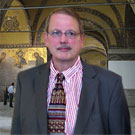
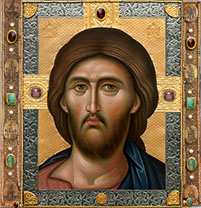 click here for icons of christ
click here for icons of christ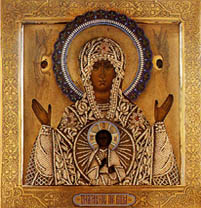 click here for icons of the theotokos
click here for icons of the theotokos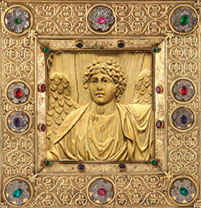 click here for icons of angels
click here for icons of angels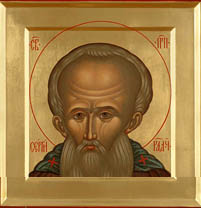 click here for icons of saints
click here for icons of saints








